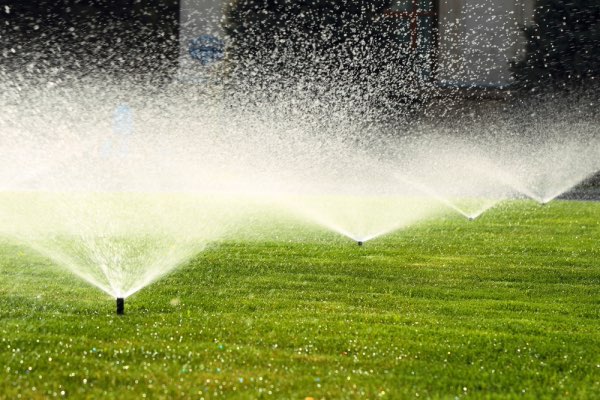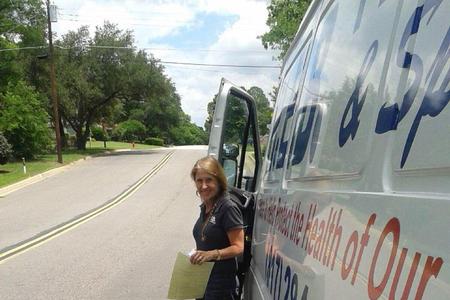
Hard water can have a significant impact on your home’s appliances, plumbing, and more. Hard water can also lead to expensive repairs and higher water bills. The North Texas Water District has “moderately hard” water. But what exactly is hard water? In this blog post, HEB Plumbing & Sprinkler looks at what hard water is, how it affects your home’s appliances, and what you can do about it.
If you have questions about hard water, please contact a reputable professional.
Please note: Be cautious when handling appliances. Maintenance should only be carried out by a trained professional.
What is Hard Water
According to the U.S. Geological Survey, “…water hardness is generally the amount of dissolved calcium and magnesium in water.” How soft or hard water is is measured by grains per gallon (gpg).
Hard water testing kits can be purchased from a number of sources, including hardware stores, home centers, and the Internet.
- 0-3 gpg is said to be soft water.
- 3.5-7 gpg is regarded to be ideal and moderate.
- Greater than 7.5 gpg is regarded as hard water, which should be treated by using a water softener.
Contact your local water utility or local municipality for more information on water hardness in your area. They may offer a report on it.
Hard water is a naturally occurring process that occurs as water “travels” from clouds to underground aquifers.
A possible indicator of hard water is when you remove a glass from a dishwater and see a film or spots.
How Does Hard Water Affect Your Appliances?
Hard water reduces the efficiency and longevity of appliances that use water.
In the following section, we highlight how hard water can affect a number of appliances and things around your home.
Clog Pipes and Fittings
Hard water can cause build-up in all pipes, but it is more likely to occur in hot water pipes. As scale builds up, it constricts pipe openings—decreasing the flow of water and water pressure at fixtures such as shower heads and faucets. If it gets exceptionally bad, the scale can even block pipes entirely, causing them to burst!
Filthy Showers and Fittings
Not only can hard water clog shower heads, but it can also make them dirty when scale builds up there. Hard water can even result in dry skin and hair!
Discolor Sinks and Bathtubs
As water frequently comes into contact with your sinks and bathtub, mineral deposits from hard water may lead to discoloration. As you don’t want to be bathing with the results of hard water, you’ll want to get the problem remedied as soon as possible.
Clog Faucets
The chlorine and magnesium deposits from hard water can clog faucets over time.
Dirty or Clog Washing Machines
Hard water damages clothes—making their colors fade and wearing them out quicker than normal. Hard water can build up at your washing machine’s filter screen and pumps, along with other moving parts, reducing your machine’s efficiency and lifespan.
Create Chalky Dishwashers
Not only can hard water damage glassware and utensils, it can also shorten the lifespan of your dishwasher.
Create Unresponsive Water Heaters
Hard water negatively affects both electric and gas water heaters, wasting electricity, water, and money. When heated, hard water turns into a rock-like material known as hard water scale that builds up towards the bottom of the tank or where the heating element is located. This makes the water heater less efficient and ultimately leads to it breaking, as it must heat through the hard water scale.
Cause Obstructions to Sprinklers

The scale from hard water can block sprinklers—not something you want to deal with in a Tarrant County summer!
Solutions to Hard Water
There are a number of ways to treat hard water. In the following sections, we detail some hard water solutions. Some of these help prevent hard water, while others help deal with the results of hard water.
Whole House Water Filtration System
With a whole house water filtration system, you’ll have softer water along with less common contaminants in your tap water.
Water Softener
A water softener is the most common way to treat hard water. A water softener is a water filtration system that filters out hard water minerals. There are several types of water softeners available. Speak with an expert to determine the right one for your situation.
Showerhead Filter
Using a showerhead filter can remove the minerals that are in hard water (among other things). While it won’t protect the rest of your house, it will help your shower. A showerhead filter can also help reduce dry and flaky skin.
Anti-Scale System, a.k.a. Salt-Free Water Conditioner or Descaler
An anti-scale system, a.k.a salt-free water conditioner or descaler, uses a process known as template-assisted crystallization (TAC) to make hardness minerals crystallize to make them unable to scale. It is important to note that anti-scale systems do not soften water. This is not as effective as using a water-softening system.
While the crystallization process does not soften water, it prevents the minerals from sticking to surfaces.
Anti-scale systems do a good job of preventing scale from clogging up pipes and faucets. Hardness crystals can even clear out scale in pipes.
Vinegar
Vinegar works exceptionally well for cleaning scale build-up due to its acidic nature. To use it, let it soak into scum for one hour at least.
For appliances with long cycles, such as a washing machine or dishwasher, apply a cup of vinegar (in place of detergent) and use a normal wash cycle with an empty machine.
Coffee makers and kettles can be treated in a similar manner. Fill the appliance full of vinegar, then have it sit for one hour. Once the hour is up, carefully boil the mixture; then pour out the mixture.
If you’re dealing with scaly faucets, you can try wrapping a tea towel that has been soaked in vinegar around it for an hour. When this is done, you should be able to wipe off a lot of the grime. You may have to apply some pressure, but you can also use a vinegar-soaked towel to scrub away scum in sinks and tubs.
Appliance Cleaner
Using appliance cleaners removes scum from appliances—allowing them to function more efficiently. Please note that this option may be expensive.
HEB Plumbing and Sprinkler Can Help!

If you are in Tarrant County, Texas, and suspect you have hard water, contact the HEB Plumbing & Sprinkler professionals. HEB Plumbing & Sprinkler can help if hard water has resulted in clogged or leaking pipes or if it has damaged your sprinkler. We also offer other plumbing services to help keep your plumbing functioning correctly. We’ve received multiple awards and many five-star reviews for our work. We also maintain an A+ rating from the Better Business Bureau. Our team looks forward to providing you with outstanding plumbing services!
